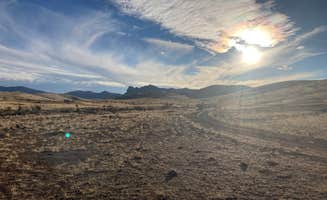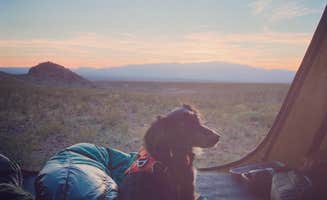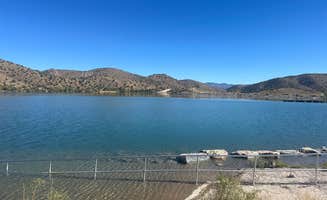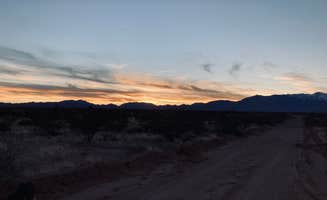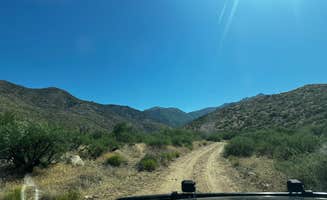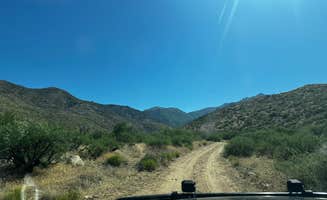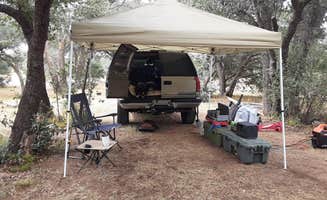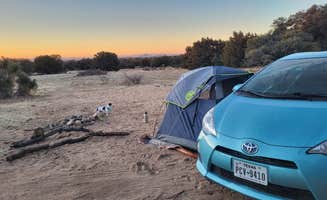Rustic camping near Duncan, Arizona offers access to unique desert landscapes with temperatures ranging from 90s during summer days to 40s at night in spring and fall. Bureau of Land Management lands surrounding Duncan create a high desert environment at approximately 3,600 feet elevation. Campers frequently encounter grazing cattle on active rangeland throughout these dispersed camping areas.
What to do
Rock collecting opportunities: The Black Hills Rockhound Area and surrounding lands offer plentiful rock collecting. "Millions of years ago, volcanic activity in the Southwest create lava rocks and fire agate. Inside the Rockhound area you can walk and collect fire agates right off the surface of the ground. It is the desert equivalent of searching for sea shells at the beach," notes one visitor.
Off-road exploration: Many camping areas connect to networks of trails suitable for ATVs, 4x4 vehicles, and dirt bikes. A camper at Black Hills Rockhound Area suggests to "bring an ATV, 4x4, or dirt bike and enjoy miles of trails and dirt roads."
Rock climbing and bouldering: Indian Bread Rocks provides natural rock formations ideal for climbing. "If you're into rock climbing, there's plenty of it and you could find some Indian artifacts," according to a reviewer. The unusual boulder formations create natural climbing routes of varying difficulty.
What campers like
Desert sunsets and sunrises: The open landscape at Haekel Road Dispersed Camping provides unobstructed views of dramatic sky colors. "We found a nice level unobstructed spot looking out at the snow capped peaks of Mt. Graham," reports one visitor who appreciated the panoramic views.
Solitude and remoteness: Dispersed sites typically offer significant privacy from other campers. At Granite Gap, a camper noted, "Extreme solitude... when I was there, I was the only one."
Cell service availability: Unlike many remote areas, most camping locations maintain serviceable connectivity. At Haekel Road, "Verizon via Visible 2-3 bars. ATT via Straight Talk 3-4." Another camper confirmed, "Not far off the highway. This one gets added to the Will RETURN list."
What you should know
Road conditions vary significantly: Access requires planning and appropriate vehicles. At Round Mountain Rockhound Area, "Be prepared as the drive in is difficult and long. Larger RVs are not recommended as the road has many steep washouts and ruts. The main dirt road leading into the area has bad washboard bumps."
Wildlife and livestock awareness: Open range cattle move freely through most camping areas. "Watch out for the cattle including bulls. They haven't bothered me but just want to make sure you're aware they're around and could be in the road," warns a camper at Indian Bread Rocks. Some areas also have wildlife concerns. One camper noted, "She said a bear was just shot yesterday a few miles north of here. Be vigilant."
Weather preparedness: Desert conditions bring temperature extremes and wind. "We experienced lots of high wind gusts. As a precaution, We took our awning down in the middle of the night, but our roof top tent was fine," reports a visitor. Another notes simply, "Nice in morning and amazing sunset. Lots of other campers. Not really a big rig place in my opinion."
Tips for camping with families
Rock hunting activities: Children enjoy searching for interesting rocks and minerals. "Small fire agates are all over the area but mostly chalcedony available," notes a camper at Black Hills Rockhound Area. This provides a natural treasure hunt activity.
Terrain awareness: The area includes cactus, sharp rocks, and occasional hazards. "Be careful as some of the cactus will scratch you badly if you're not careful," advises a camper at Tanque Road Dispersed Camping. Closed-toe shoes and supervision for children are essential.
Educational opportunities: Several sites contain evidence of historical activities. A visitor reported, "Awesome remnants of Native American activity." This creates natural learning opportunities about regional history and geology.
Tips from RVers
Site selection considerations: Finding level ground can be challenging. "We decided against camping here because the road is a bit sketchy. The only spot big enough has a large bump that would likely tip my travel trailer farther than is safe," notes an RVer.
Rig size limitations: Most areas accommodate smaller rigs better than large ones. At Indian Bread Rocks, "There are about five to ten campsites suitable for small rigs (we pull a 17-ft trailer, wouldn't go much past 20ft)."
Distance planning: Remote locations require preparation. "Free dump station at the Water Reclamation Plant in Safford, just sign in, dump, sign out. They also have water to rinse, not potable," advises an RVer at Haekel Road, highlighting the need to plan for services not available at campsites.


